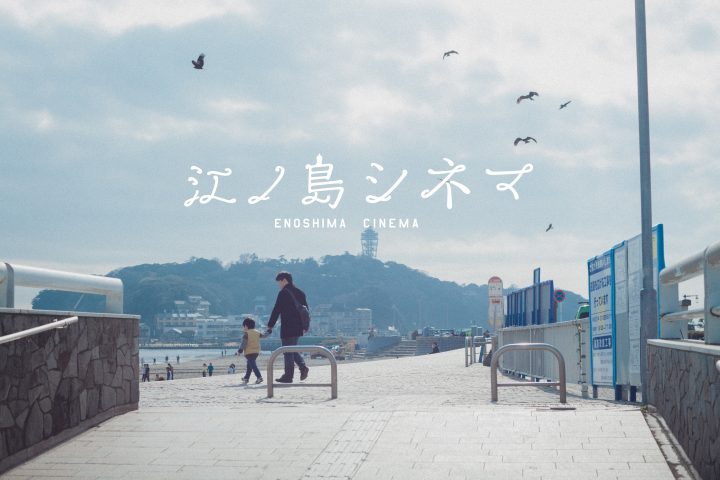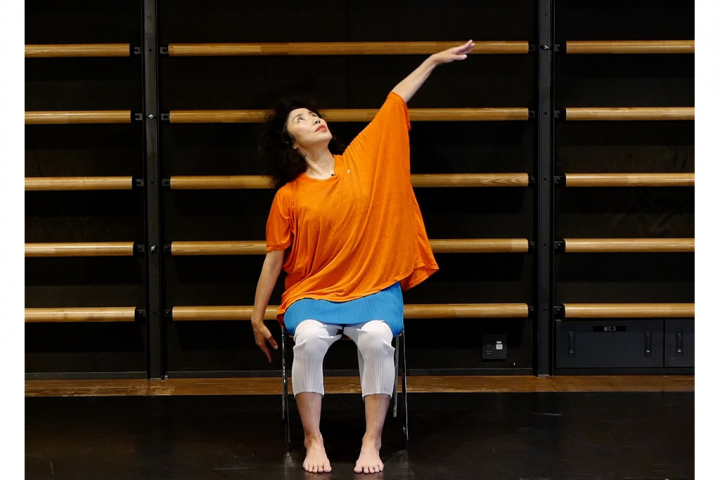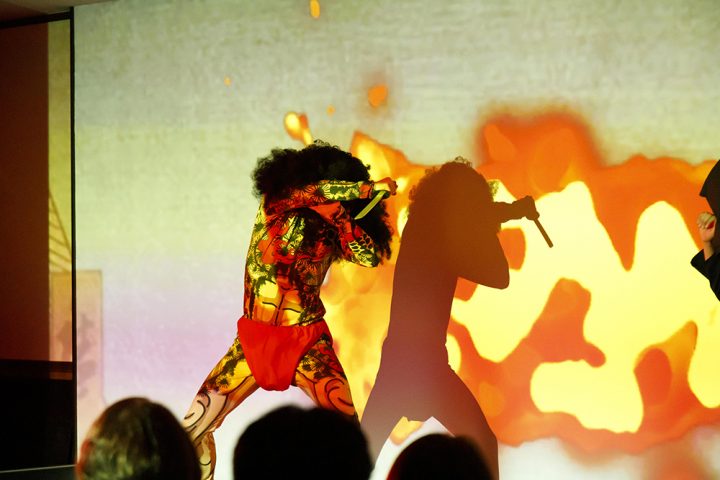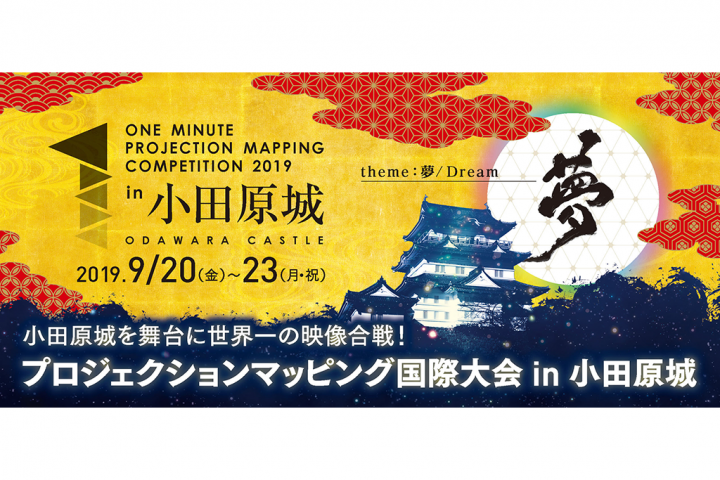An interview with producer Tetsuya Kinouchi of the film "Candidacy"
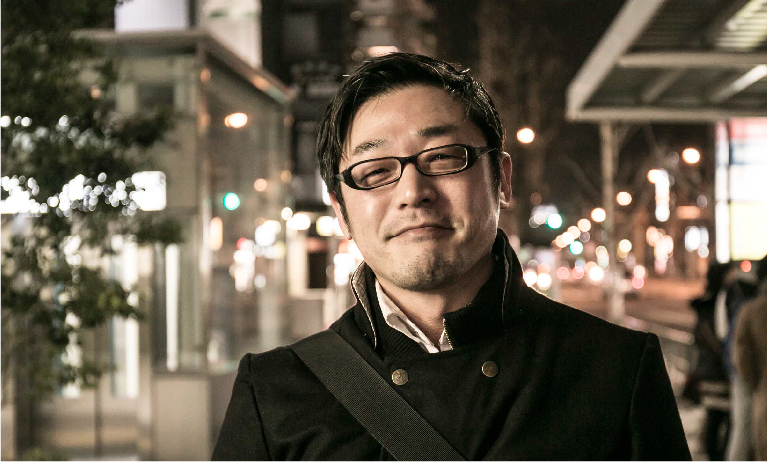
While watching the news about the Tokyo gubernatorial election in February, I was reminded of a movie that made an impression on me last year.
The film in question is "Candidacy," which won the documentary category at the 68th Mainichi Film Awards.
The film focuses on those who are called "bubble candidates" in elections. To put it bluntly, it focuses on those who are thought to have "no chance of winning."
However, I thought it would be a critical documentary about elections and politics... but my expectations were completely wrong.
It was a movie that left me with a strange feeling, a mixture of emotion and doubt.
"What on earth was that? Why McDonald's Akasaka?"
After doing some research into various questions, I discovered that the producer involved in the production actually lives in Kanagawa.
Magcal conducted an interview to answer this question.
This time, we welcomed documentary filmmaker Gen Umin as a guest interviewer, and he will also share his perspective from the production side.
We spoke with Kinouchi Tetsuya, producer of the film "Candidacy," about the film.
How did that film come about?
Photo shoot cooperation: Isshin Tasuke Shinkoenji store http://tabelog.com/tokyo/A1319/A131904/13123087/
Guest Interviewer: Gen Umin
Photo, Interview & Text: Masamasa Nishino
■ Tetsuya Kinouchi
Producer & Photographer Born in Tokyo in 1971
Graduated from Massachusetts College of Art and San Francisco Art Institute, Department of Film Studies
In 2005, he was in charge of photography for the film "Missiles on Mt. Fujiyama" directed by Toshimitsu Fujioka. Since then, he has been involved in many of Fujioka's films.
"Ritsukouho" Movie Website: http://ritsukouho.com
■Gen Umin
Born in 1985, she has directed "To-la-ga" (2010), which follows a visit to the grave of her grandmother, who was once a female diver on Jeju Island in South Korea;
His work includes NO PLACE LIKE HOMELAND (2011), which photographed young people of diverse Korean origins in Seoul.
His work focuses on people who leave their birthplace and continue to move.
He is currently preparing to begin filming a new series set on a Korean passenger ferry.
2011 Graduated from the Graduate School of Film and New Media, Tokyo University of the Arts
Participated in the 13th Tokyo Filmex Talent Campus Tokyo in 2012
He has also participated in many productions by Akira Takayama's theater group PortB.
ーーーーーーーーーーーーーーーーーーーーーーーーーーーーーーーーーーー
■In conjunction with this interview, we received a comment from Cinema Jack & Betty Manager, Kajiwara Toshiyuki.
"The Movie 'Candidacy'" was released in Tokyo at the end of June, just before the July 2013 House of Councillors election, and was screened at Cinema Jack & Betty in Yokohama in August of the same year, during the Yokohama mayoral election, along with the documentary films "Campaign 2" and "Muneoism: 13 Days of Love and Madness," both of which were also election-themed. Both are excellent works with highlights, and I think it was good that we were able to introduce them together at that time. What impressed me about screening "The Movie 'Candidacy'" was that after watching it, all the customers said they were moved. The more they laughed, were surprised, and felt uncomfortable about the election campaign of the fringe candidate, the more they were moved in the end, and it came back to them. "When you realize it, you've been given a lot of courage." The reason why more young people saw it than the films we usually screen at our theater may be because it has entertainment value with laughter and tears, and a message that is rare in documentary films. As young people are not only turning away from politics but also from films and movie theaters, director Fujioka Toshimitsu and producer Kinouchi Tetsuya are currently the most talked-about figures in the independent theater scene.
Cinema Jack & Betty Manager Toshiyuki Kajiwara
http://www.jackandbetty.net
−How I got started on filmmaking/Meeting with the director−
Gen: Mr. Kinouchi, were you studying film while you were studying abroad in Massachusetts?
Kinouchi: Yes, that's right. But you started out as a sculptor.
Gen: So you didn't originally go to America because you had to make movies.
Kinouchi: It wasn't something I was absolutely certain about. I was interested, though.
In the case of the film “Candidate,” the director was Fujioka Toshimitsu, so I was more in charge of the camera and also looking at the editing to see what the weak points were.
Gen: Is Fujioka also the editor?
Kinouchi: Yes. He edits everything. We look at it together about once a month.
Gen : How much editing did you do?
Kinouchi: All things considered, I think I was doing it for a little over a year.
Gen: Just editing?
Kinouchi: No, the election period is only 17 days, so we shoot for about 20 days, but we use those 20 days of footage as a base to build the edit. We compare the footage, or rather, we look at the edit he makes, write it down in a notebook, and say things like, "Maybe we should put this word in here," or, "This part isn't explained well enough, so let's bring in the footage from here," and we do that kind of finishing work, and then we say, "It's a bit lacking," and go shoot again (laughs).
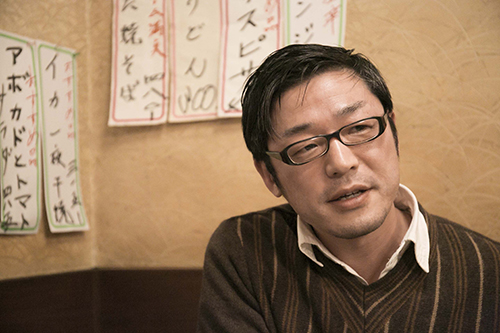
Gen: Is that during the period?
Kinouchi: No, after it was over. The filming period was about a year in total. Because we were persistent.
Gen: Did you have any sort of composition chart before you started shooting?
Kinouchi: No, nothing. All I have is a one-page proposal that Fujioka-kun wrote called "Dream Chaser."
Gen: Oh, there aren't any left at all. By the way, what was the trigger for making this movie?
Looking at your profile, I see that you previously produced a feature film with Fujioka Toshimitsu, the director of this film.
Kinouchi: Yes, yes. "Missiles to Mt. Fuji." "That 's right.
I wonder how long Fujioka and I have been together. I think we've been together for about 10 years. We were both working at a commercial production company. He joined the company and worked under me, and he was very talented. But then he suddenly said he was quitting, so when I asked him why he was quitting, he started saying something like, "I came from Yamaguchi to make a movie, but I haven't been able to make it yet" (laughs). Well, I like movies too, so I asked him to show me the script. And it was really interesting. So I thought, this is it.
Gen: Yes, yes.
Kinouchi: At that point I had been working as a salaryman for seven or eight years, so I thought that was enough.
Gen: Have you always been with that company?
Kinouchi: Right. So I said, "I'm quitting too, so let's make it together!" and we both quit.
Gen: Huh?
Kinouchi: I quit my job to make a film, and although I was able to release it, it only got a late release or a two-week run. I also sent it to various film festivals, but none of them were accepted, which was quite a shock.
Gen: I see. But you two risked your lives for that.
Kinouchi: That's right. Because I had two children. (Everyone: laughs)
Gen: Was there any opposition?
Kinouchi: Well, it was a matter of timing, and also because the book was interesting.
This is like, "Let's aim for 'Mad Thunder Road' !"
Gen: I see.
Kinouchi: I thought I'd put together something like "Mad Thunder Road" and John Cassavetes ' "A Woman in Distress." But it was nothing at all (laughs).
But I still couldn't make a living, so I started working at a new company again, and since this new company was also in advertising, I asked him to work as a director and we made commercials together.
Gen: Ah, I see, I see. So your relationship continued after that.
Kinouchi: That's right. And basically we had the same style. I was the producer, but we usually didn't have a big budget, so he was the director and editor, and I was the cameraman and producer. But then he went back to Yamaguchi. His family runs a newspaper stand, but his father got injured, and there was talk of marriage. So he was like, "I'm giving up on film and going back home." We talked about that a lot, too. "If we work a little harder, we'll be able to make a living, so let's make another film together." But we'd already made a decision, and it wasn't just one person's thing.
Gen: Yes, yes.
Kinouchi: So then you go to weddings and stuff like that. And when you go, the mother or someone else says, "Thank you so much for treating me like a little brother in Tokyo. But Toshimitsu (the director's name) has decided to take over the newspaper business" (everyone laughs).
Gen: When was that?
Kinouchi: About five or six years ago.
Gen: So it's been two or three years since filming the previous film.
Kinouchi: I think so. So this film is of course a documentary, but more than that, I think it's a big story about "film director Toshimitsu Fujioka." In the end, he returned to Yamaguchi and continued working at the newspaper stand, but he couldn't give up on his dream... I think that's where the film started.
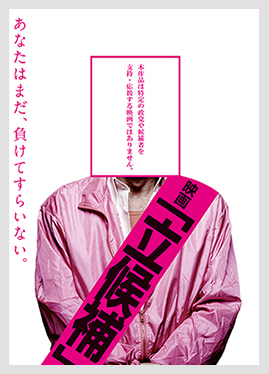
©word&sentence
The main visual for the movie "Candidate". Currently, Mac Akasaka has announced his candidacy for the Osaka mayoral election.
The design has been changed to emphasize fairness.
-Why Documentary/Why Mac Akasaka-
Gen: When you started working with Fujioka again, why did you decide to make it a documentary?
Kinouchi: That's because while Fujioka was delivering newspapers, he started thinking, "I want to go back to film again. But what is the best way to do it within my capabilities?" He didn't originally intend to make a movie out of this subject. At first, I had heard that it was something like an interview video that would be uploaded to YouTube.
Gen: Did you have a plan to do something like this?
Kinouchi: Yes. The interviews were with Junichi Yaoi, a researcher who believes in UFOs,
Fujioka-kun also likes people who are chasing the Tokugawa buried treasure and the people from "Monthly MU."
Gen: I see, I see.
Kinouchi: So, I went to ask them if they really believed in it, and if so, how they were going to make it happen, and I planned to upload it to YouTube as a series.
Gen: Yes, yes. It really was like warming up my shoulders.
Kinouchi: That's right. It's like a little bit of rehabilitation.
Kinouchi: So, in terms of politics, Koichi Toyama went to check whether the people who were calling for the overthrow of the government were serious about it. Then, he discovered that there was a genre of so-called "fleeting candidates," and Seizo Hashiba Hideyoshi and Mac Akasaka appeared.

©word&sentence (From left: Koichi Toyama and Seizo Hashiba)
Nishino: So while you were searching for someone like that, you happened to come across Mac Akasaka.
Kinouchi: That's right.
Nishino: It's not like you immediately went straight into elections and politics.
Kinouchi: That's true, but Fujioka's father has been a politician for a long time, and I also like politics, so we talked about those kinds of things.
Gen: Ah, I see, I see.
Kinouchi: I simply like politics, history, movies, etc. I don't really understand UFOs though (laughs).
So, he said, "I got an appointment with Toyama-san, so I'm off for a bit!" and went to Kyushu by himself, and after taking some pictures, I asked him, "What are you going to do next?" and he replied, "For now, I'll try to approach someone called Mac-san." So I sent him a letter from Yamaguchi, and we talked on the phone, and then we started talking like, "Why don't you come and meet me?"
So when I went there, Mac said, "I'm going to be elected governor of Osaka, and Hashiba-san should come, so you should take a picture of him." It was like, "If Hashiba-san is Hideyoshi, then I'm Nobunaga."
Declaration of recapture of Osaka (laughs).
Gen: Mac wrote the plot. (laughs)
Kinouchi: Like, "We can film the recapture election, so why don't you go and film that?"
Then, finally, Fujioka called me and said he thought this would be interesting so we decided to work together.
So I wasn't really thinking about releasing it to the public or anything like that.
I was so happy to hear that Fujioka-kun was returning to the world of film that I cried, so I thought I'd do anything. However, because of the previous film, I wanted to give it my all the next time. When Fujioka-kun went to see Mac-san and heard about it, he probably felt a sense of accomplishment, or thought, "This will make a good picture."
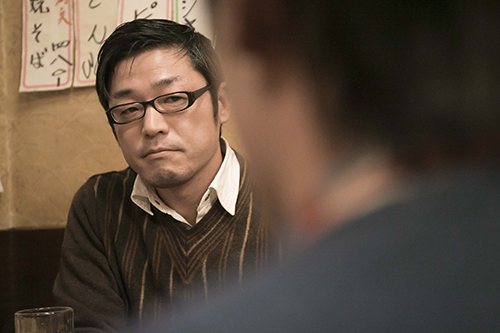
Gen: I see. I thought that from the beginning there was the issue of "fleeting candidates" and that Mac-san stood out as he was being filmed as a whole, but if anything, it felt more like he was pulled by Toyama-san and Mac-san and got further and further into the story.
Kinouchi: That's right. That was the trigger, but I knew those fringe candidates were going to lose. Why would they take the initiative when it's obvious they're going to lose? In order to find out, I filmed them equally, because I didn't want it to become propaganda for the candidates. I mean, the people who were appearing, or the people running for election. It's not easy to film fringe candidates. So I filmed them at the last minute... They refused, or rather, I couldn't catch them. They didn't answer the phone, they didn't go to their houses. So I was like a newspaper reporter from the Showa era, or a detective drama from the Showa era, and I wasted the whole day waiting around.
Gen: They're playing tag.
Kinouchi: Yes. I would wait in front of my house from early in the morning and say things like, "The morning paper hasn't been picked up yet!" It really was a world of sweet bean buns and milk (laughs).
Gen: But you stuck with it, right? It wasn't like, "It's inefficient after all, so let's change it."
Kinouchi: It all comes down to the plot that the director decided on, and we have to film it fairly.
So when I was editing it at first it was about two and a half to three hours.
Gen: The finished version is about 100 minutes long.
Kinouchi: Yes. They were all chosen fairly. And it was horribly boring (everyone: laughs).
Gen: There was a different version at one point.
Kinouchi: Yeah. It was so boring I was like, "What am I going to do with this?"
Then I let it sit and worked on it again... and gradually Mac started squeezing it.

©word&sentence (Image: Mac Akasaka giving a speech)
Gen: I see. I heard that they started filming after filming had already started.
After going through those editing stages, we decided on the direction that "Ah, this is Mac."
Kinouchi: Yes. But no matter how many times we interviewed Mac, the words we needed didn't come out. The only thing that came out was "smile," so we just couldn't understand anything. Well, I'm a producer and cameraman, and Fujioka is a director, so we were worried. This is bad (laughs).
So, I decided there was nothing I could do about it, went back to Osaka, and went to shoot some new material.
Nishino: Was that Kinouchi-san's decision?
Gen: No, no, that was Director Fujioka's. It was his intuition as a director that said, "This isn't going to work."
So I started following the secretary, Sakurai-san, and other people around him at the same time. Mac-san doesn't talk, and when I ask him about it, all he says is "smile," so I don't know what he's talking about.
So, I'm going to explain Mac starting from his outline.
Gen: Yes, yes.
Kinouchi: "The image of a fringe candidate being solidified by those around him." If I explained the core of that, there would be no need to make a movie about it.
Gen: That's true.
Kinouchi: When you look back at interview footage, I'm sure there are words somewhere that the interviewee chose to use.
If we try to match them up again, I think we'll see a lot more.
And when you add the effect of a time axis to it, it instantly becomes more profound, regardless of whether it's interesting or not.
Something that was previously flat becomes three-dimensional, or rather, it has depth. I think that's probably what's so interesting about documentaries. Documentaries that are worth watching are sure to be rewatched again in 10 or 20 years' time.
- The photographer and the photographed / Expectations and betrayals -
Gen: Listening to what you're saying now, I'm wondering how you decided when to stop?
Kinouchi: Ah, that definitely has to do with the final scene in Akihabara, right?
Gen: Yes, yes.
Kinouchi: Because I was able to take that picture.
Gen: I see.
Kinouchi: It was like, "Oh, this is the last one." At the end, Mac's son suddenly changes.
In other words, if you can film a person who changes drastically in a movie, it might work to a certain extent, because it's a drama.
At that point, the story begins to tell itself. "Why did he suddenly change?" Well, it's not really a sudden change, it's a transformation.
Nishino: Once you had taken those images, did you have the image of putting them together like a drama, rather than a documentary?
Kinouchi: The original ending was shot during the 2011 election period, and I used that as the climax. I held free screenings and saw the reactions.
Nishino: It was completed at one point.
Kinouchi: That's right. We held a screening of a version that had Governor Hashimoto's election speech as the climax. Well, we thought we'd show it to everyone. But we only got a lukewarm response, and while we were doing that, that was... I think it was the 2012 Tokyo gubernatorial election.
That final scene was shot one year after the film was completed.
Nishino: So in the end, you weren't able to predict anything from the motif to the end, right?
Kinouchi: Yes, yes. Previously, Tatsuya Mori also said to me, "Hey, you guys weren't taking photos on purpose, were you?" "No, that's right" (laughs).
Well, I had kind of thought about it, but I didn't think it would turn out like that.
Nishino: Mac ran in the recent Tokyo gubernatorial election, but you're no longer following it, right?
Kinouchi: Well, I'm still following him. I've applied to interview Mr. Hashimoto. He's going to run for mayor of Osaka soon, isn't he? I'd like to shoot him from his point of view this time.
Gen: So when you put the two films together, doesn't this film seem like a "pretend" to Hashimoto? Hashimoto is a pretty well-defined character, so there are a lot of people who remember him, right? Like the final press conference scene.
Kinouchi: But according to Fujioka's plot, it's not just about politicians, it's about "a work that praises all candidates." That's how the world should be. People are quick to criticize others, aren't they? It's common for Twitter to go viral. But I don't think that's a very good thing. People nitpicking on others, complaining about them. I think that kind of thing shrinks the world, or rather people's consciousness. I think it would be better if the world was one where there were all kinds of possibilities. I think it's a shame that people nitpick and laugh at others like that.
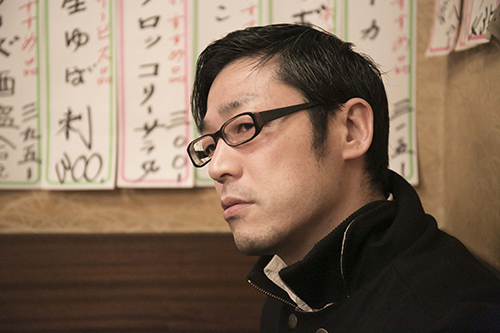
Nishino: It feels like all of that is brought together in the last scene. It certainly gives you that feeling of "we got it done."
Kinouchi: That's why documentaries are so difficult. I'm not sure if Mac is really a good person.
Gen: I imagine there are times when you get annoyed with your subject while taking photos.
Kinouchi: Yes, there are. There still are.
Nishino: I'm curious as to how you continued to film that... Is there "love" in it?
Kinouchi: Ah, I think the director did a great job. Because there are some scenes where Mac suddenly gets angry and is quite unreasonable. But we were the ones filming it, and we saw all of those things and it turned out that way, but I think it was Fujioka's declaration of intent. "Let's try filming again." I think that part is no different from Mac and the people who are called fringe candidates, who go forward even though they know they will be ridiculed. And denying Mac would mean denying themselves, so they didn't do that... I think there was also something like a belief. It's very easy to fall to the dark side. I don't think there's anything bad about criticizing the subject of the filming.
Gen: In Fujioka's case, it's not that type of thing.
Kinouchi: Yes.

©word&sentence
Nishino: But somehow in the end, it felt like that was betrayed, or like it became a filter.
At first, it seemed like Mac was portrayed as an interesting guy, but soon after, they filmed all of his embarrassing behavior that left the audience dumbfounded, like him barging into a school festival and giving a harassing speech, or getting drunk and running out into the street...
It leaves you feeling confused, in a good way, wondering "How does this movie ultimately want to treat Mac?"
Kinouchi: That's right.
Gen: As a viewer, you might be watching Mac thinking, "I don't think I can like this guy," but then it ends like that, and you get the feeling, "Maybe we were watching it from that perspective too."
Kinouchi: It's like a boomerang. Because that's what we did too. The camera position is also far away at first. Because we're composing it from a distance at first. You can't help but pull back, because you feel like pulling back (laughs).
Nishino: Ah, that's interesting.
Kinouchi: Of course, I consider my own feelings as a photographer, but I also take into account the reactions of the people around me when creating my images.
Gen: I see, it's exactly like the first election commission room.
Kinouchi: That's right, that's why you pull back.
Nishino: It was really impressive.
Kinouchi: But it gradually gets closer. Mac becomes more and more interesting, and I'm drawn in. The camera position also starts high, but gradually gets lower. There was a big change in the scene of Hashimoto's speech, because at that time we were looking down at him with the camera on the end of a boom about 4 meters high, but after that fight, when you see the face of Don Quixote, filled with the sadness of a hopeless human being, you can't help but say, "I give up." The camera has no choice but to lower (laughs). We lowered the camera and filmed it as if looking up at the subject. That's what it looked like, because it really seemed like a human being, or rather, a divine hero. And I think that we changed completely because we were able to film that. Naturally, I think that's reflected in the editing. I think Fujioka's editing was excellent, but we ourselves also changed. There, we follow the story and keep in step with the customers.
Gen: So the photographer felt the same way.

©word&sentence
Left: Mack's son gets into an altercation with members of the crowd who were attending his first speech.
Right: A scene where Mr. Mack looks sad as he watches the speech.
-Theme song "Street Lights" / Link between content and lyrics-
Nishino: Kinouchi-san sang the theme song for this movie, right? I think that's a very rare style for a producer.
Personally, I like it because it reminds me of THA BLUE HERB .
Kinouchi: Ah, at first we were thinking of asking THA BLUE HERB. The director said he wanted to use the song "Nora Inu" by THA BLUE HERB.
Nishino: That's right!
Kinouchi: So, he sent me the audio and when I listened to it, I realized that the lyrics and stuff were really similar.
Gen: Yes, yes.
Kinouchi: So, the lyrics written by Il Bostino (MC of THA BLUE HERB) and the contents of the movie "Candidate" are very linked. In the lyrics, there is a moment when one day, a pet dog wearing a collar passes a stray dog living alone. Naturally, the lyrics are written from the perspective of the stray dog, but the moment they pass each other, the perspective changes and the pet dog looks lonely and says something like "You too will know the despair of this life someday" to the stray dog. I think that probably had the same effect as the boomerang that is thrust at the end of the movie "Candidate". I think that's what caught Fujioka's attention. So he said he wanted to use it. So I contacted Il Bostino.
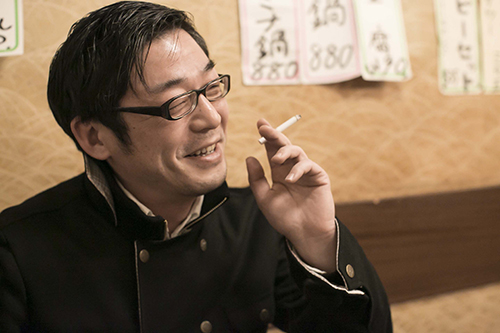
Nishino: So you did make an inquiry. What was the reaction?
Kinouchi: It's all gone (everyone laughs).
Nishino: There wasn't even a reaction (laughs).
Kinouchi: That's right. Well, I tried a few times but I couldn't get there.
Well, I thought it would be impossible to pursue it any further. But I thought, "I can write this." Because we're making a movie together.
Nishino: I understand it best. I mean, the content, or the perspective.
Kinouchi: Exactly. So it was just in line with the line of sight. The song is called "Street Lights," and the lyrics all echo the movie "Candidacy."
Gen: I see.
Kinouchi: The lyrics "grabbed by the collar, spat on, trampled on and ridiculed" are from Mac's point of view. And the "destination of the hero is the west of the dump." "West" is when Mac looks very sad after confronting Hashimoto, and in the background there is a huge sign that says "Go West." So the destination of the hero is not Journey to the West, but something like "Head west, head to India," or "The twisted Gibran that passes by shouts and whispers in your ear." And there is a poet called Khalil Gibran . Gibran wrote a collection of poems called "The Prophet," and the person who imitates it is Toyama Koichi.
Gen: Ah.
Kinouchi: That's why the famous "Dear Voters!" line in his campaign broadcast is a prophecy. A prophet. That fits the image, doesn't it?
Gen: Ah, that's definitely him! At first I thought it was Mac's movie, but when I started watching it, I was like, "Huh? This guy is cool."
Kinouchi: But unfortunately, that prophet stopped running in elections after the 2007 Tokyo gubernatorial election. So I wasn't able to follow him up (laughs).
-What's wrong with entertainment? / Directing a documentary-
Gen: Going back to what we were saying about music, the scenes featuring Sakurai and his son at the end really evoke emotions.
So, when you watch it as a movie, it's the music and things like that that really take you in.
Kinouchi: Yes, yes.
Gen: I guess I was carried away. But if you take a step back and look at it from a different perspective, I think you could criticize it as being "carried away by emotion."
Kinouchi: That's right. When we talked about the so-called documentary genre, some people pointed out the issue of adding music and the way graphics were processed. Yes.

©word&sentence
(Image: Sakurai (left) in a private scene with his family. He serves as secretary to Mac Akasaka.)
Nishino: In that sense, the posters are very stylish, the graphic logos and copy are catchy, and the introduction is very thorough.
Kinouchi: Yes. That's right. I think it's better to ask Fujioka about that than to me, but it's not about the genre, it's about "what do you want to convey?" I think the editing is just an extension of that. Not many people talk about it, but you could say that this movie can also be seen as a "music movie." You can use as much music as you want during Mac's election speech. I rediscovered the issue of whether to add narration or not. And from Fujioka's perspective, those sound effects, for example the scene where Mac slurps and sucks the Onikoroshi, and the footsteps, were added by Fujioka.
Gen: Oh, isn't that the actual sound?
Kinouchi: That's right. There were two of us filming, so the microphone couldn't reach him. Fujioka was slurping away with a straw. He's not very good at it again (laughs). If he wanted to do it more naturally, he could, but Fujioka was doing it all by himself, so there were limitations. But Fujioka said, "That's the narration."
Nishino: I see.
Kinouchi: So, for him, the typography of the subtitles and the motion are also narration and explanations. They are just an extension of editing, and the element of music is also a form of narration.
This language does not have words, but adds visual and auditory sensations as explanations.
Gen: So there are no specific rules like "This is a documentary, so it has to be done like this"?
Kinouchi: Well, it's better if it's interesting, right? Because if it's not interesting, people won't watch it. It's not the minimum level of manners, but you have to be greedy to get people to watch it. So, if you eliminate all of that and there's something that's composed, and the movie makes 10 billion yen at the box office, then that's fine.
If people say 10 million people watched it, I think that's a good thing.
That's what you have to aim for. I think it's just a matter of "how do you fight to get people all over the world to see it?" If you're like, "No, it's fine if it reaches 1,000 people," then you can go for that. If you can make a living from it. What I just said is a bit like a producer, but I think it's about "how do you set it up?" So I don't think you need to be so hung up on a format. It's about "how do you communicate it."
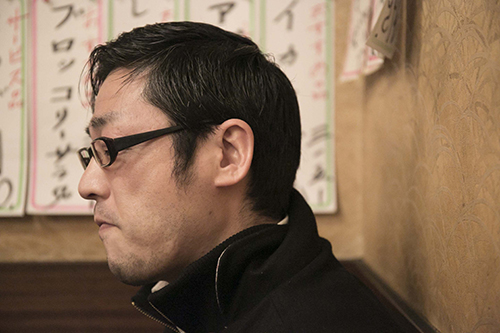
Nishino: Regarding that approach, are there any directors who influenced you or works that you often refer to before making a documentary film like this one?
Kinouchi: Well, it's Tarkovsky . Usually it's either Tarkovsky or Coppola 's "The Godfather" 1 or 2, or "The Deer Hunter" or something like that, or, um... Cassavetes ! I really like them.
Gen: It feels like I'm fighting (laughs). Speaking of fighting methods, I'm also a documentary filmmaker, but I try to think of fighting in the same way as Tarkovsky or Coppola.
Kinouchi: Fujioka-kun is like that, he's from "Nausicaä of the Valley of the Wind."
Gen: Nausicaa! Eh (laughs).
Kinouchi: Because Nausicaa is his masterpiece.
Kinouchi: It's not a big romance, it's about tracing the conflicts between ethnic groups in history, and asking "How should humans live?" in the midst of that. It's really interesting to see Fujioka-kun's thoughts on that. And the other day, at the Mainichi Film Awards ceremony, Suzuki-san from Ghibli was there, and I met him for the first time, so I said to him, "Next, let me do a live-action version of The Valley of the Wind!" (laughs).
Nishino: Live action (lol)!
Kinouchi: Yes. So, when I was asked, "How do you take the pictures?"
"We'll take the photo from Tormekia! Not from the Valley of the Wind side, but from the Tormekia side!" (laughs).
Nishino: I see. That's very thorough.
Kinouchi: Yeah, well, Star Wars, I guess (laughs).
-Why did they run for office? / Five options-
Gen: Another thing I really wanted to ask was, why did they run for office? Do you have an answer?
Kinouchi: Well, Fujioka found that. There are only five options.
Gen: Yes, yes.
Kinouchi: The first thing that appears are five options.
It took me a really long time to get to that point (laughs).
Gen: Ah.
Kinouchi: That's all there is. The options for political participation are,
There are only five options: "Complain at home," "Complain outside," "Go vote," "Run for office," and "Start a revolution."
Gen: I see.
Kinouchi: So, they made the choice to run for office, but as for why they did so, it was because they were dissatisfied with the current state of politics.
Gen: Hmm. So that's something they have in common?
Kinouchi: I think so. I might be able to replace it with other words, but that's about all I can say.
So, it's embarrassing to complain at home, there's no point in complaining outside, and just going to the polls is ineffective, so instead you have to start a revolution or run for office.
Gen: I see. So you decided on the title at that stage?
Kinouchi: I chose the title "Candidate" after I finished filming and looked at the edit in January or February. There were about 100 ideas, but "Candidate" was the simplest, or the most direct. If it were me, I think it would have been a bit more emotional.
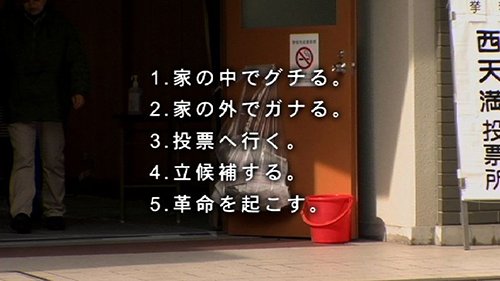
©word&sentence
-Reactions to the film "Candidacy" and future prospects-
Gen: Come to think of it, when Mac was giving an election speech, foreigners passing by said things like, "This is impossible."
That place also left quite an impression on me.
Kinouchi: Ah, that's right.
Gen: So, as you've been following this whole performance controversy, have you ever wondered what level Japanese politics and democracy is at?
Kinouchi: Quite a bit. When I looked up things like voting rates in other countries, I thought that Japan is surprisingly politically conscious. In terms of the reaction, when I looked at the comments on blogs, I thought that a lot of people understood it. If you just look at it as content, I think it would be a target of criticism, but I felt like there were a lot of positive opinions. But paradoxically, that's also proof that it hasn't reached people. Because no matter how masterpiece a work is, there are people who say it's no good. But I think that's because it has reached people. There are people who say that "The Godfather" and "2001: A Space Odyssey" are no good. Even though they are so well made that it's like "It's Shakespeare!" (laughs)!
Gen: That's true (laughs).
Nishino: By the way, I think that Mac-san has also gained more followers on Twitter because of this movie, and the movie actually started out as a self-screening and has since developed into being shown in proper theaters. I think that means that there is a certain demographic that accepts this movie, but do you have any predictions from the production side about how those people will accept the movie "Candidacy"?
Kinouchi: I think that people who are attracted to the copy "Why fight when you know you'll lose?" or to people who are attracted to the genre of "fringe candidates" are people who are feeling some kind of persecution or obstruction from society.
Nishino: I guess I was being hindered... (Everyone: laughs)
Gen: It's amazing that Mac has 400,000 followers on Twitter, but is he just having fun?
Do people like that come to see "Candidacy"?
Kinouchi: I don't think there were many. There may have been some people who really liked the film, but I think the people who came to see it were pretty hardcore "movie fans." Yes, well, I guess that's the next challenge.
Nishino: I think that Director Fujioka and Producer Kinouchi have the image of being the people who made "Candidate" through this work, but they started out by shooting feature films, didn't they? Do you have any plans to handle political motifs in the future? Or are you not particularly concerned about that?
Kinouchi: Yes, I love it. I feel a sense of romance in it. (Everyone: laughs)
So at that point, I had the feeling that it would be limited to certain people.
Gen: But that's a really good story. Even if it's really hard and you're asked to do it again, it doesn't mean that you don't want to do it anymore.
Kinouchi: That's right.
Gen: I think we can do something just with this theme.
Kinouchi: Because I like it (laughs).
Nishino: I never thought I'd get a comment just because people like me (laughs).
Kinouchi: Yeah. It's almost like a hobby. That's why it's hard to make a living from it (laughs).
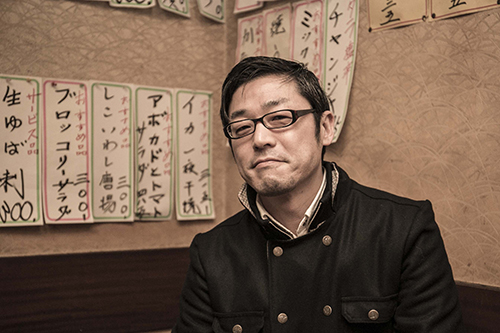
<Editor's Note>
After the interview, I felt that the movie "Candidacy" is not a movie to criticize elections or politics. Of course, it is not a movie about Mac Akasaka, who is the main character, nor is it a movie that makes fun of fringe candidates. What is shown there may be the image of "people who fight without giving up even though they know they will lose" and the director who saw themselves in that and the producer who supports them. Everyone has their own way of fighting, and no one is in a position to criticize that. To quote the movie's tagline, "You haven't even lost yet." What kind of works will Producer Kinouchi and Director Fujioka create in the future? It is impossible to predict, but personally, I look forward to a documentary that is the best entertainment!
